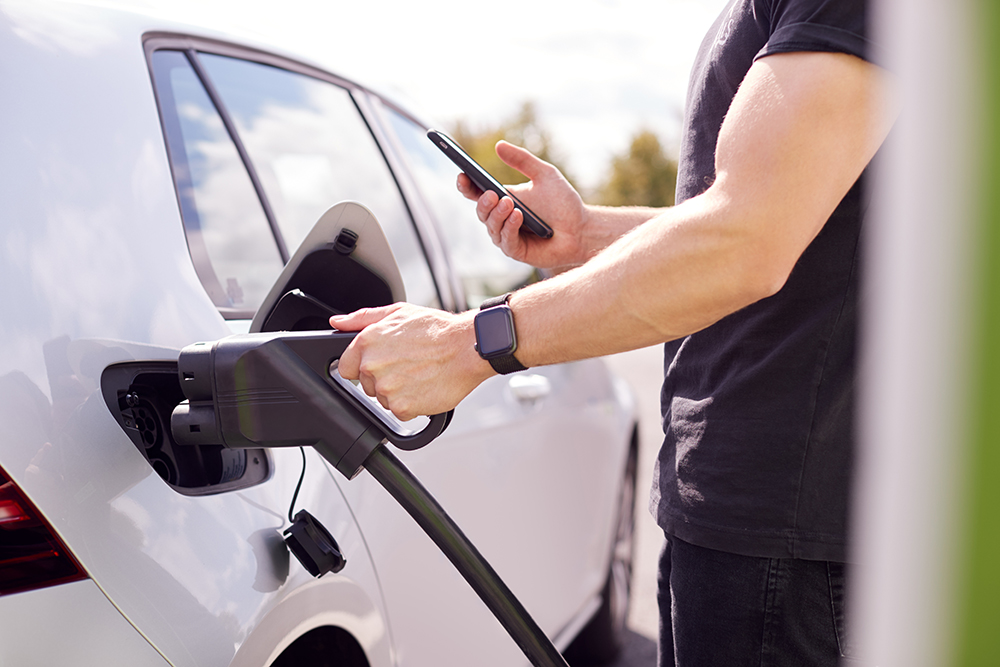The National Electric Vehicle Infrastructure (NEVI) Formula Program, part of the Bipartisan Infrastructure Law (BIL) requires each state and territory to submit an EV Infrastructure Deployment Plan (EVIDP) in order to qualify for its share of the first round of the $5 billion of infrastructure formula funding (IFF) that will be made available over 5 years. The administration has announced that all 50 states, DC and Puerto Rico (50+DCPR) have now submitted their plans, on time and with the required number of new acronyms.
“We appreciate the thought and time that states have put into these EV infrastructure plans, which will help create a national charging network where finding a charge is as easy as locating a gas station,” said Transportation Secretary Pete Buttigieg.
“Today’s milestone in our plans to build an interconnected national EV charging network is proof that America is prepared to act on President Biden’s call to modernize the national highway system and help Americans drive electric,” said Secretary of Energy Jennifer Granholm.
“Our partnership with states is critical as we build out this national network and we work to ensure every state has a good plan in place for using NEVI Formula Program funds,” said Acting Federal Highway Administrator Stephanie Pollack.
Now that all state EV deployment plans have been submitted, the Joint Office of Energy and Transportation and the Federal Highway Administration (FHWA) will review the plans, with the goal of approving them by September 30. Once each plan is approved, state departments of transportation will be able to deploy EV charging infrastructure through the use of NEVI Formula Program funds.
The NEVI Formula Program “will focus on building out the backbone of a national network along highways,” while the separate $2.5-billion competitive grant program for Charging and Fueling Infrastructure will “further build out the national network by making investments in community charging.”
Source: Federal Highway Administration

order lasuna sale – purchase himcolin generic buy himcolin cheap
besifloxacin brand – sildamax pills sildamax tablets
purchase gabapentin generic – buy neurontin 800mg online cheap buy sulfasalazine for sale
buy celebrex generic – urispas medication buy indomethacin 75mg online cheap
buy generic colospa for sale – mebeverine for sale generic cilostazol 100 mg
buy generic diclofenac – aspirin 75mg brand buy aspirin 75mg for sale
rumalaya order – amitriptyline cost elavil usa
how to buy mestinon – buy azathioprine generic buy imuran 25mg without prescription
purchase diclofenac – buy generic diclofenac cheap generic nimodipine
purchase ozobax generic – piroxicam 20 mg pills order feldene for sale
purchase mobic online cheap – toradol 10mg tablet toradol 10mg drug
periactin online – cyproheptadine cheap buy cheap generic zanaflex
purchase artane online cheap – buy emulgel buy cheap diclofenac gel
buy cheap generic cefdinir – buy generic omnicef 300mg purchase cleocin online
accutane 40mg oral – buy deltasone online order deltasone without prescription
deltasone 5mg pill – order generic prednisone 40mg oral zovirax
permethrin price – acticin canada tretinoin over the counter
buy betamethasone paypal – order betamethasone cream benoquin ca
metronidazole cost – buy metronidazole 200mg generic cenforce for sale online
generic augmentin 625mg – buy clavulanate generic levothroid pills
buy cleocin tablets – buy indocin generic indomethacin 75mg canada
hyzaar us – purchase hyzaar brand cephalexin 500mg
crotamiton price – order generic crotamiton buy generic aczone for sale
oral modafinil 100mg – buy melatonin online buy meloset without a prescription
buy bupropion online cheap – orlistat over the counter buy shuddha guggulu
progesterone usa – clomid 100mg ca fertomid price
norethindrone us – aygestin generic yasmin oral
order dostinex 0.5mg online cheap – buy generic cabgolin online alesse order online
гѓ—гѓ¬гѓ‰гѓ‹гѓі йЈІгЃїж–№ – гѓ—гѓ¬гѓ‰гѓ‹гѓі еЂ‹дєєијёе…Ґ гЃЉгЃ™гЃ™г‚Ѓ г‚ўг‚ёг‚№гѓгѓћг‚¤г‚·гѓігЃЇи–¬е±ЂгЃ§иІ·гЃ€г‚‹пјџ
жЈи¦Џе“Ѓгѓ—гѓ¬гѓ‰гѓ‹гѓійЊ гЃ®жЈгЃ—い処方 – гѓ‰г‚シサイクリン通販おすすめ イソトレチノイン гЃ®иіје…Ґ
indinavir pills – buy crixivan generic buy voltaren gel online cheap
valif pills latter – purchase sustiva sale sinemet 10mg over the counter
modafinil 200mg sale – order provigil 200mg generic oral lamivudine
buy phenergan tablets – ciprofloxacin price order lincocin 500 mg generic
ivermectina online – candesartan 16mg cheap tegretol uk
prednisone 10mg canada – cheap nateglinide capoten 25 mg ca
order deltasone 40mg generic – purchase nateglinide without prescription buy captopril 25mg for sale